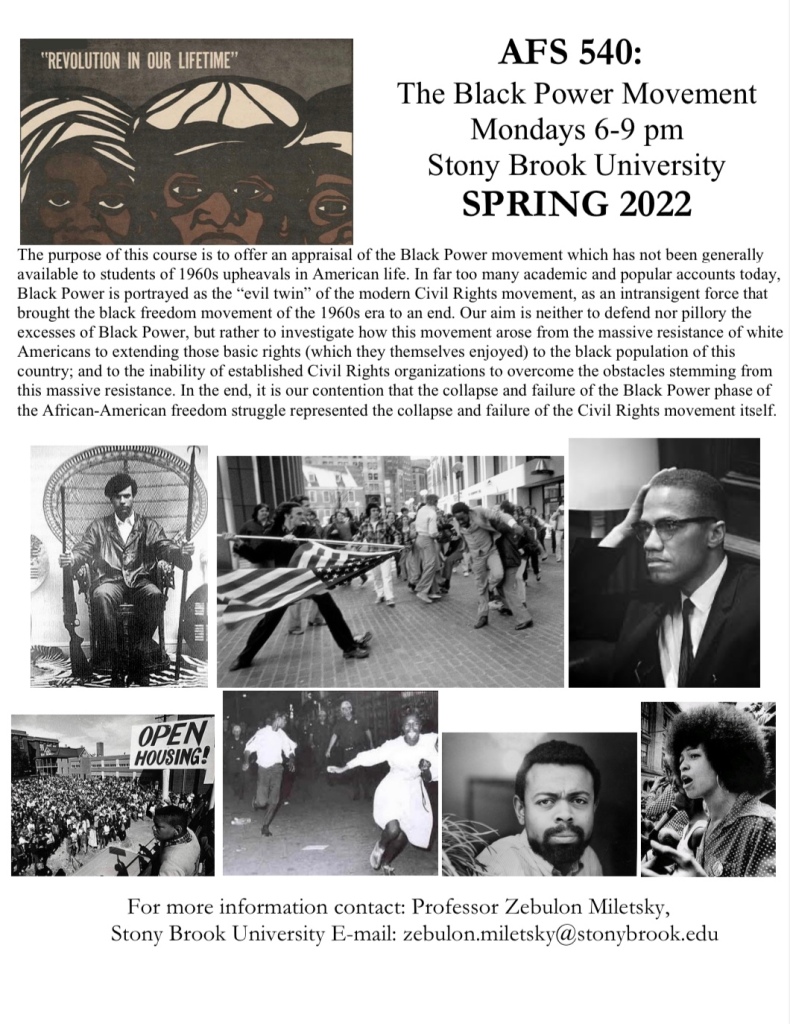Light refreshments served.
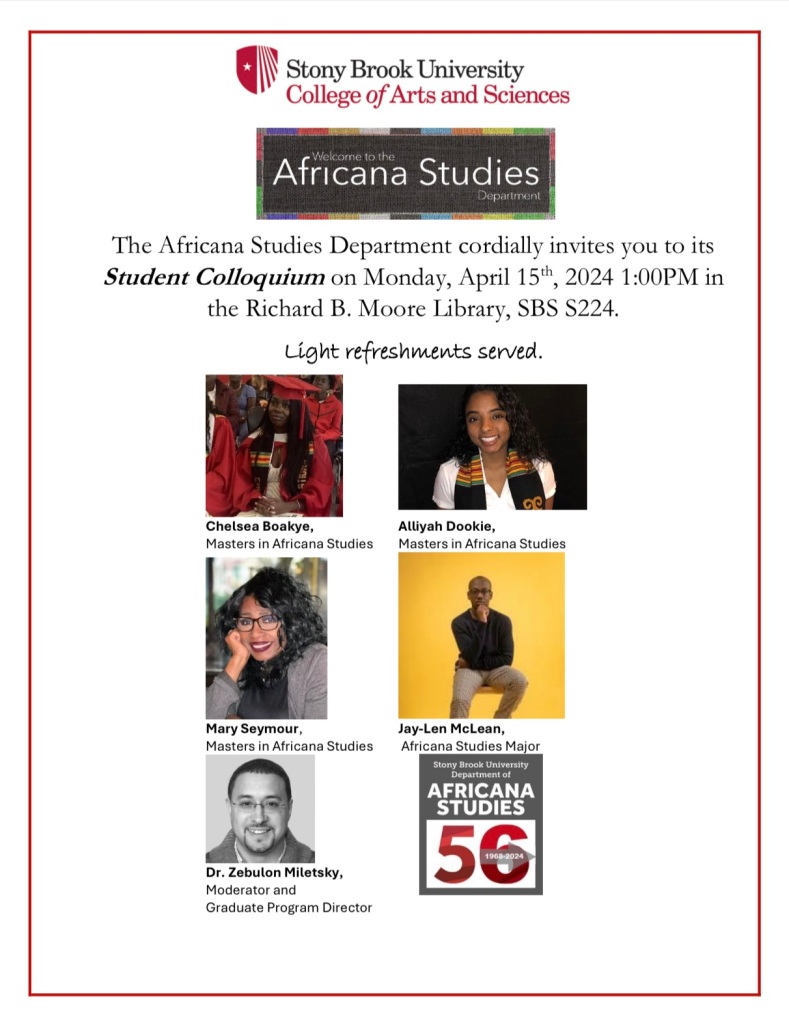
Light refreshments served.

Featured Documentaries:
Jojolo (1966); Malcolm X: The Struggle
for Freedom (1967)
Sponsored by the Humanities Institute, Stony
Brook & Department of Africana Studies
Set a reminder
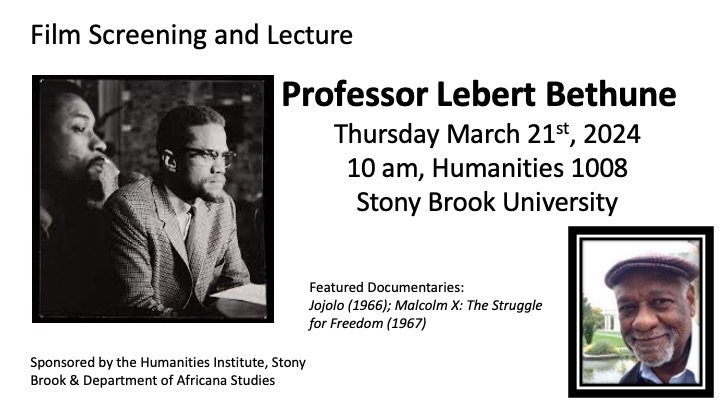

Paul W. Zuccaire Gallery
presents
Alumni Panel of the ‘60s & ‘70s:
Black student history, student activism, and the formation of the Black Studies Program (now Africana Studies) at Stony Brook University
Black Students United present Stony Brook University administration with their demands, February 17, 1969. Pictured in the 1969 Stony Brook Specula Yearbook, Courtesy of Special Collections and University Archives, Stony Brook University Libraries
Alumni Panel of the ‘60s & ‘70s: Black student history, student activism, and the formation of the Black Studies Program (now Africana Studies) at Stony Brook University
Tuesday, February 7, 5:30pm-6:30pm
Student Union Ballroom, Stony Brook University
Register here
Panelists: Deborah Britton-Riley, Mitchel Cohen, Dr. Linda Humes, and Dr. Les Owens
Location: Stony Brook University, Student Union, Ballroom
Zuccaire Gallery open hours: 12-8pm, 1st Fl Staller Center
Guided tour of Revisiting 5+1 at 4:30pm
Refreshments served in the Union Ballroom beginning at 5pm
The Zuccaire Gallery is proud to present an Alumni Panel featuring Stony Brook University alumni from the ‘60s and ‘70s. Join us Tuesday, February 7 as we explore the legacy of Black student history, student activism, and the formation of the Black Studies Program (now Africana Studies) at Stony Brook University. This program is organized in collaboration with the Department of Africana Studies, the Black History Month Planning Committee, and the Alumni Association.
Panelists
Deborah Britton-Riley
Stony Brook University class of 1973-1981; Co-founder, Black Womyn’s Association at Stony Brook University; Director, Liberty Partnerships Program, Stony Brook University, 1992-2010; Coordinator, New Student and Transition Programs, Stony Brook University, 2022- present
Mitchel Cohen
Stony Brook University class of 1965-1974; Cofounder of the Red Balloon Collective; Radical troublemaker and organizer, poet, and author of several books, the latest being The Fight Against Monsanto’s Roundup: The Politics of Pesticides (SkyHorse: new edition 2022); Banned from Stony Brook campus three times.
Dr. Linda Humes
Africana Studies Major; Stony Brook University class of 1974-1977; Vice President of Black Student Union at Stony Brook University; Co-Founder of the first Black Theater Club 1974-1976; Department Student speaker graduation 5/1977
Dr. Les Owens
Professor, Africana Studies Department, 1978-2015, Stony Brook UniversityRegister HerePresented in connection with the Paul W. Zuccaire Gallery exhibition Revisiting 5+1 which showcases the story of 5+1, a historical exhibition of Black artists working in abstraction that took place at Stony Brook University in 1969 during the first semester of courses in the Black Studies Program. Revisiting 5+1 is on view through March 31 at the Zuccaire Gallery, first floor of the Staller Center for the Arts. Free admission.

Guided Tour Before the Panel Discussion 4:30-5:00pm
Join us for a 30-minute guided tour of Revisiting 5+1
Tuesday, February 7 at 4:30pm
Zuccaire Gallery,1st Floor Staller Center for the Arts
The guided tour will focus on the history of 5+1 and student activism on Stony Brook’s campus in the late 1960s.
Revisiting 5+1 is a reflection on the historic 1969 Stony Brook University exhibition entitled 5+1. Revisiting 5+1 features work by the original six artists, all of whom were Black men, with an addition of six Black women artists, all trailblazers at a time when their work in abstraction was challenged by both the mainstream art world and Black art institutions. Photographs and archival materials exhibited alongside the work provide additional contextual history from this era of student protests and racial justice on campus. Learn more.
Open through March 31. Free and open to the public.
Hours: Monday-Friday 12-4pm and evenings of Staller Center performances.
Event DirectionsThe Alumni Panel discussion will be held in the Union Ballroom beginning at 5:30pm. The closest parking is located behind the Stony Brook Union Building. Refreshments will be offered in the Union Ballroom beginning at 5:00pm.

The Zuccaire Gallery will be open before and after the panel, 12:00pm-8:00pm. A 30-minute guided tour of Revisiting 5+1 will be offered at 4:30pm. The Zuccaire Gallery is located on the 1st Floor of the Staller Center.
Parking is free after 4:00pm weekdays and all weekend, anyone may park in any non 24-Hour Restricted lot or space. Metered lots are free after 7:00pm, Monday through Friday.Register Here—
Georgia LaMair Tomczak Public Programs ManagerRevisiting 5+1, Black Artists & Abstraction at Stony Brook in the ’60s and ’70s is open now through March 31.Zuccaire Gallery | Staller Center for the Arts Stony Brook University Office: 631.632.7240
Georgia.LaMair@stonybrook.edupronouns: she/her/hers
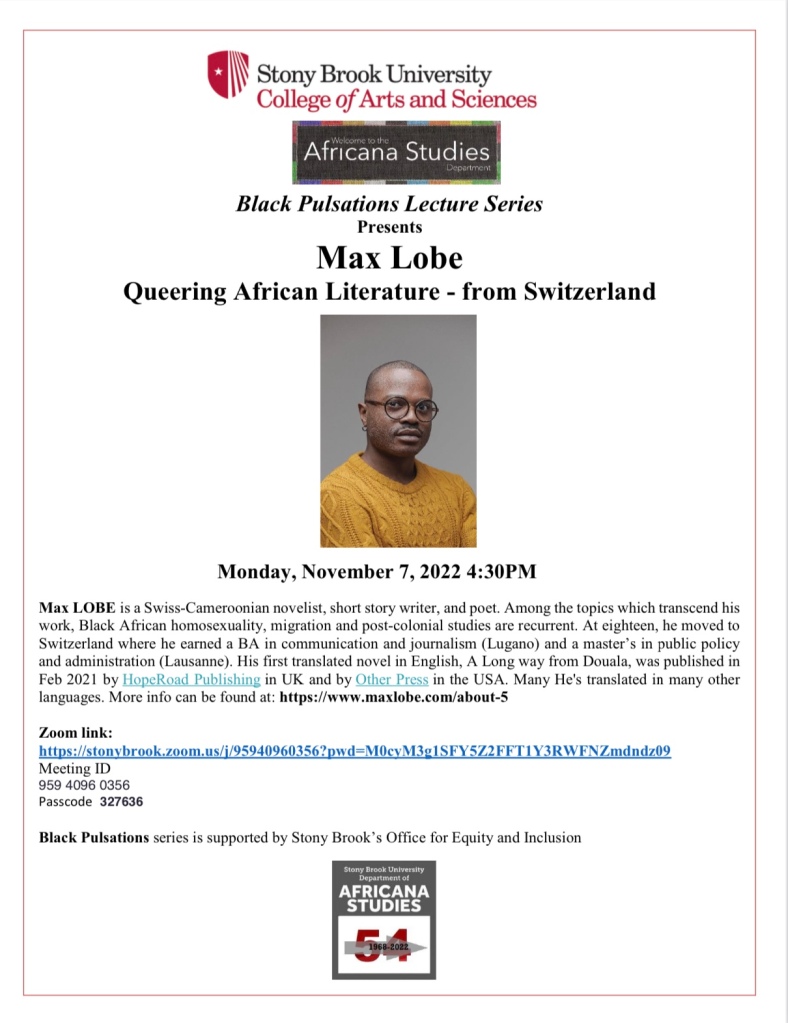
The Africana Studies Department
Black Pulsations Lecture Series
Presents
Max Lobe
Queering African Literature – from Switzerland
Monday, November 7, 2022 4:30PM
Max LOBE is a Swiss-Cameroonian novelist, short story writer, and poet. Among the topics which transcend his work, Black African homosexuality, migration and post-colonial studies are recurrent. At eighteen, he moved to Switzerland where he earned a BA in communication and journalism (Lugano) and a master’s in public policy
and administration (Lausanne). His first translated novel in English, A Long way from Douala, was published in Feb 2021 by HopeRoad Publishing in UK and by Other Press in the USA. Many He’s translated in many other languages.
Zoom link:
https://stonybrook.zoom.us/j/959409603562pwd=M0cyM3g1SFY5Z2FFTIY3RWENZmdndz09
Meeting ID
959 4096 0356
Passcode 327636
The Black Pulsations series is supported by Stony Brook’s Office for Equity and Inclusion
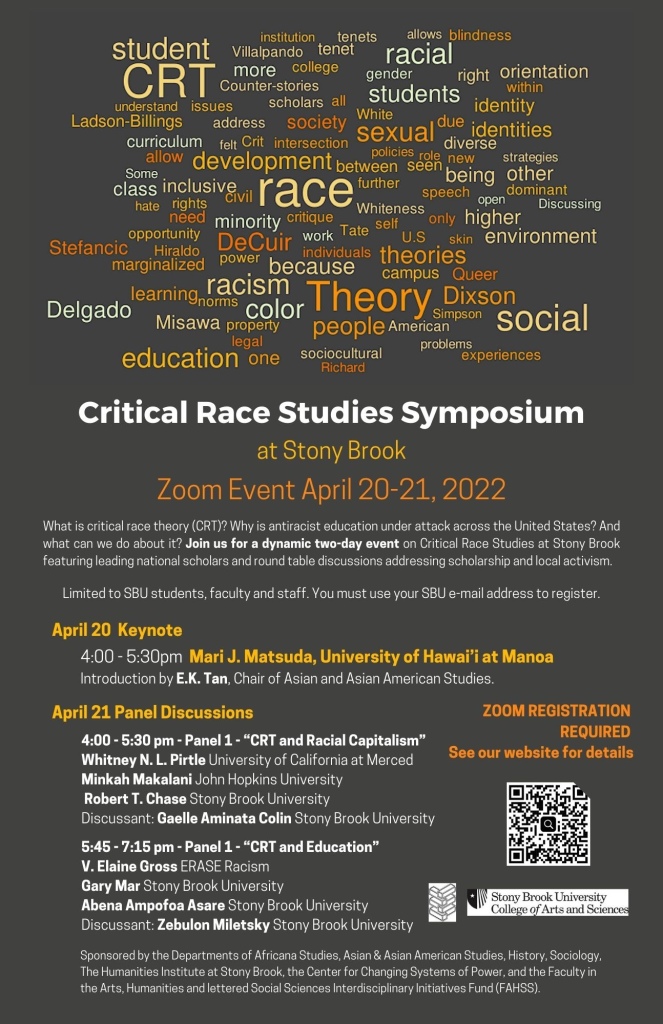
What is critical race theory (CRT)? Why is antiracist education under attack across the United States? And what can we do about it? Join us for a dynamic two-day event on Critical Race Studies at Stony Brook featuring leading scholars and a round table discussions addressing scholarship and local activism.
This event is limited to SBU students, faculty and staff. You must use your SBU e-mail address to register. Please click here to register.
Sponsored by the Departments of Africana Studies, Asian & Asian American Studies, History and Sociology, The Humanities Institute at Stony Brook, the Center for Changing Systems of Power, and the Faculty in the Arts, Humanities and lettered Social Sciences Interdisciplinary Initiatives Fund.
Wednesday, April 20 | 4:00 pm – 5:30 pm
Keynote: Mari J. Matsuda, the University of Hawai’i at Manoa
Limited to SBU students, faculty and staff. You must use your SBU email address to register.
Register for these Zoom events
April 21 Panel Discussions schedule:
4:00 – 5:30 pm – Panel 1 – “CRT and Racial Capitalism”
Guest Speaker: Whitney N. L. Pirtle, University of California at Merced
Guest Speaker: Minkah Makalani, John Hopkins University
Faculty speaker: Robert T. Chase, Stony Brook University
Discussant: Gaelle Aminata Colin, Stony Brook University
5:45 – 7:15 pm – Panel 1 – “CRT and Education”
Guest Speaker: V. Elaine Gross – ERASE Racism
Faculty Speaker: Gary Mar, Stony Brook University
Faculty Speaker: Abena Ampofoa Asare, Stony Brook University
Discussant: TBA
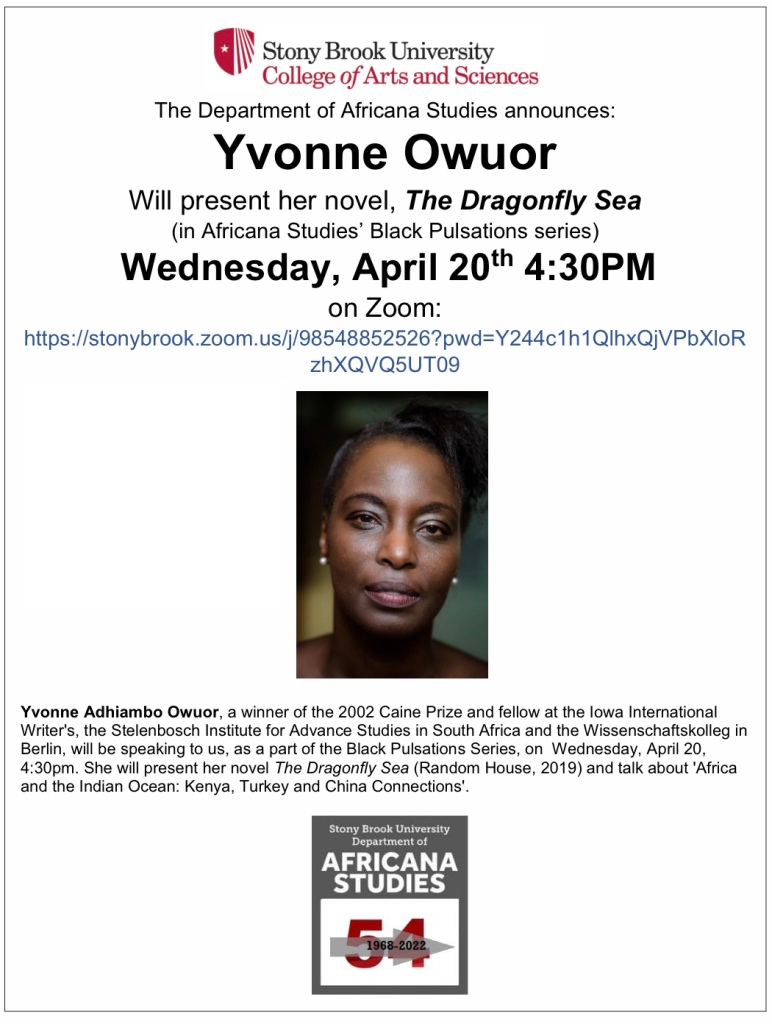
The Department of Africana Studies announces:
Yvonne Owuor
Will present her novel, The Dragonfly Sea (in Africana Studies’ Black Pulsations series)
Wednesday, April 20th 4:30PM
on Zoom.
https://stonybrook.zoom.us/j/98548852526?pwd=Y244c1h1QlhxQjVPbXloR zhXQVQ5UT09
Yvonne Adhiambo Owuor, a winner of the 2002 Caine Prize and fellow at the Iowa International Writer’s, the Stelenbosch Institute for Advance Studies in South Africa and the Wissenschaftskolleg in Berlin, will be speaking to us, as a part of the Black Pulsations Series, on Wednesday, April 20, 4:30pm. She will present her novel The Dragonfly Sea (Random House, 2019) and talk about ‘Africa and the Indian Ocean: Kenya, Turkey and China Connections’.
Mark Milton Chambers, Rivers of Gray Gold: Lead Mining and Its Impact on the Natural and Cultural Environment, 1700-1840.
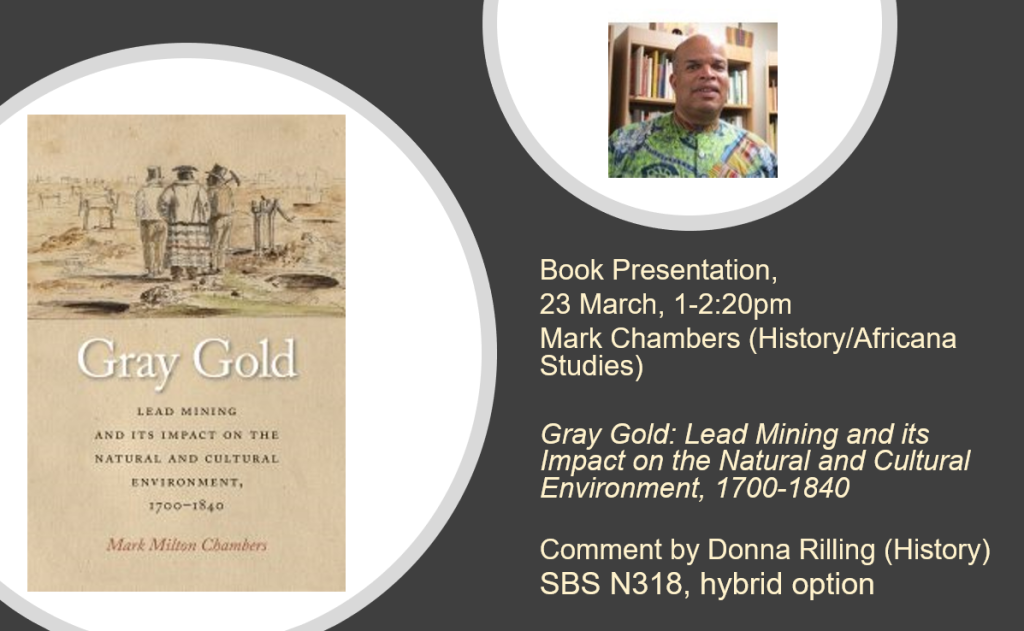
Rivers of Gray Gold: Lead Mining and Its Impact in the Natural and Cultural Environment, 1720-1840 offers a fresh perspective on early Native American, French, African American, and American settler contact. Illuminated through the cultural lens of lead mining in the region that became the state of Missouri, Rivers of Gray Gold argues that the convergence of Indian mining and smelting practices with French, African, and American settler mining knowledge and technology that together impacted the socio-cultural transformation of the region. To unearth the story of collaboration between various peoples and their technological acumen in this emerging environment, my work digs into archaeological and ethnographic sources, shipping manifests, early scientific literature, and other primary documents.
My research integrates the hinterland into the larger story of empire and nation. To complicate the historical depiction of Colonial America as a fur trapping or farming frontier, my narrative begins with pre-contact Indian mining practices, then looks at lead mining in the French, Spanish, and Anglo- American contact periods, and concludes in the mid-nineteenth century. Rivers of Gray Gold makes important contributions to Native American industry and metalworking, and the precontact development of lead technologies and the coordination with French, African, and American metallurgists has not been addressed.
Rivers of Gray Gold covers a number of under-studied themes in Native American and American pre- industry including early Native American metal working, French colonial industry, French colonial social-cultural interaction with Native and African groups, early lead mining and smelting, and technological evolutions in early lead manufacture. While slavery in early American industry has been touched on in scholarship on iron manufacturing and coal mining, this monograph adds to that work and provide additional details and context especially as the debate on slavery was beginning in the United States.
Rivers of Gray Gold discusses the development of Native American lead production and the use of African American slaves to overcome labor shortages and to perform the most dangerous tasks in lead production. I also examine linkages between mining and smelting technology and the growing demand for lead and lead products and environmental and health concerns. The expansion in lead production resulted in increased furnace vapors that impregnated drinking water and coated vegetation. This form of pollution primarily affected free and enslaved African-American metallurgists and the animals in the region, an ecological impact downplayed by speculators in the mining district.
Long before early technological exchanges extended across the Atlantic to what would eventually become the United States, indigenous peoples and new comers engaged in lengthy and complicated interactions to create an amalgamated process of extracting, producing, and trading lead ore. For over one hundred years, miners engaged in a cross-cultural dialogue that created hybrid-mining techniques. These techniques had social and cultural repercussions in the Early American Republic. Combined American Indian and European technologies influenced American settler perceptions about Native American practices as they established early mining communities to increase the flow of galena to manufacturers in New Orleans, Philadelphia, and New York and the flow of African American slave scientific knowledge and skills to these early mining communities.
Along with the increase flow of lead to eastern shores cites in the United States cities and the increase in the number of African American miners in the early nineteenth-century, deadly examples of the
growing unhealthiness of the mining district also became apparent as lead particles and vapors hoovered over the mining district. In 1843, the first published account of lead poisoning appeared in the St. Louis Medical and Surgical Journal regarding a case in 1816, involving a thirty-year-old African American miner who presented the usual symptoms of colica pictonum – lead poisoning. Following the man’s death and post-mortem examination, it was reported that the man’s mucous membrane in the alimentary canal was found to be in a highly inflamed condition. This case clearly established the fact the presence of lead poisoning a direct result of how the scale of lead production and the application of new methods affected African American human health.
Rivers of Gray Gold traces the broad development of lead manufacture from Native American controlled mines to colonial frontier Missouri territory to American occupation in a region that would produce lead for the next two centuries. Under this broad theme, my research explores how French metallurgists collaborated with Native American metalworkers and African slaves to develop a hybrid system that was relatively simple and inefficient with low production volumes in comparison to contemporary European practices, which preceded the implementation of European techniques in the district and the increase of African American slave miners and metallurgists who helped to develop a well-marketed growing industry at the expense of an increase number of slaves becoming exposed to lead poisoning.
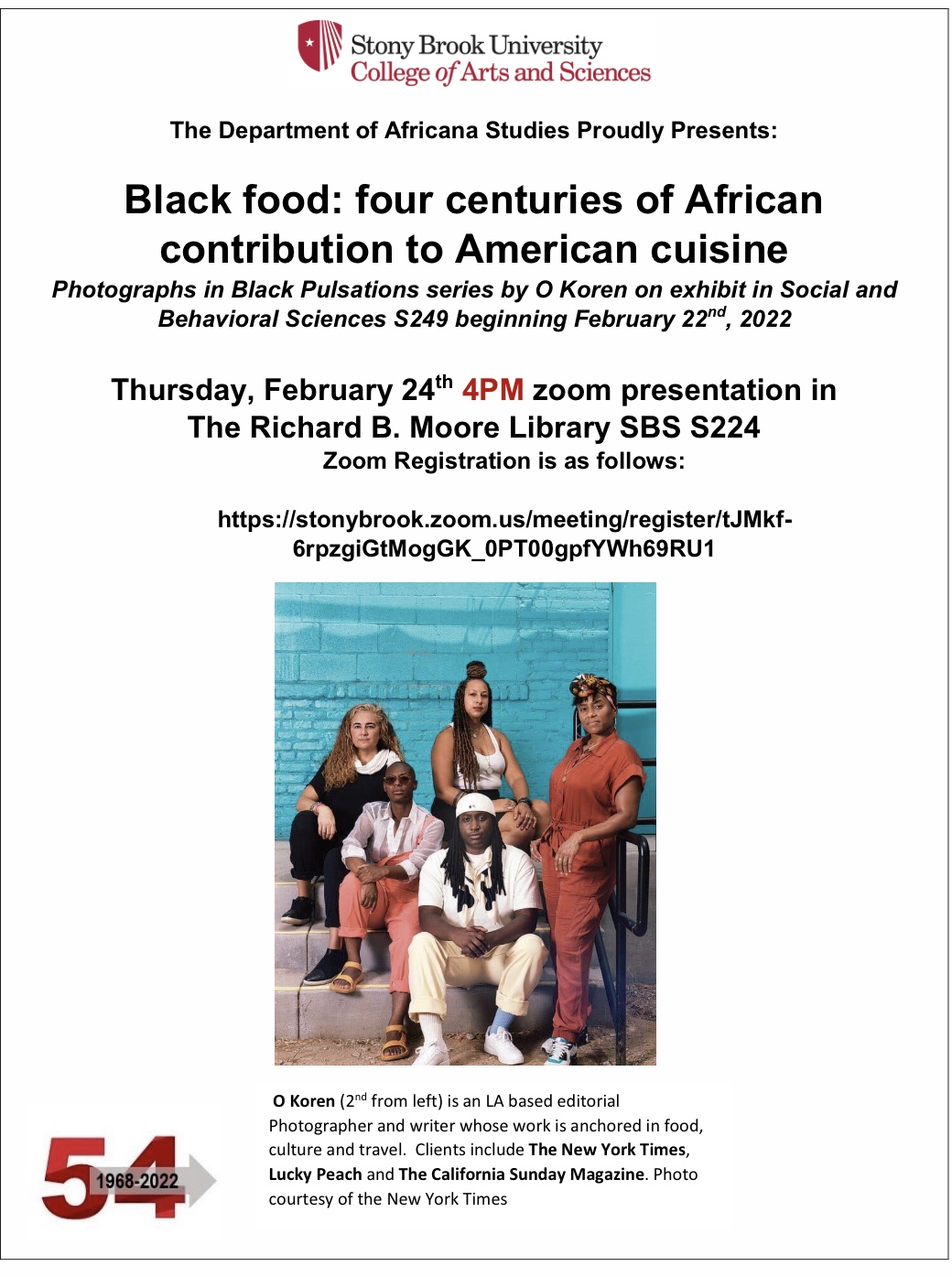
Stony Brook University
College of Arts and Sciences @sbuartssciences
The Department of Africana Studies @sbuafricana Proudly Presents: Black food: four centuries of African
contribution to American cuisine
Photographs in Black Pulsations series by O Koren on exhibit in SBS S224 starting Feb 22
Black food: four centuries of African
contribution to American cuisine
Photographs in Black Pulsations series by O Koren on exhibit in Social and Behavioral Sciences Hall, The Richard B. Moore Library, SBS S224 beginning February 22nd, 2022…
Thursday, February 24th 4PM we have a zoom presentation.
Zoom Registration link is https://stonybrook.zoom.us/meeting/register/tJMkf- 6rpzgiGtMogGK_0PTO0gpfYWh69RU1
O Koren (2nd from left) is an LA based editorial
Photographer and writer whose work is anchored in food,
culture and travel. Clients include The New York Times,
Lucky Peach and The California Sunday Magazine. Photo
courtesy of the New York Times
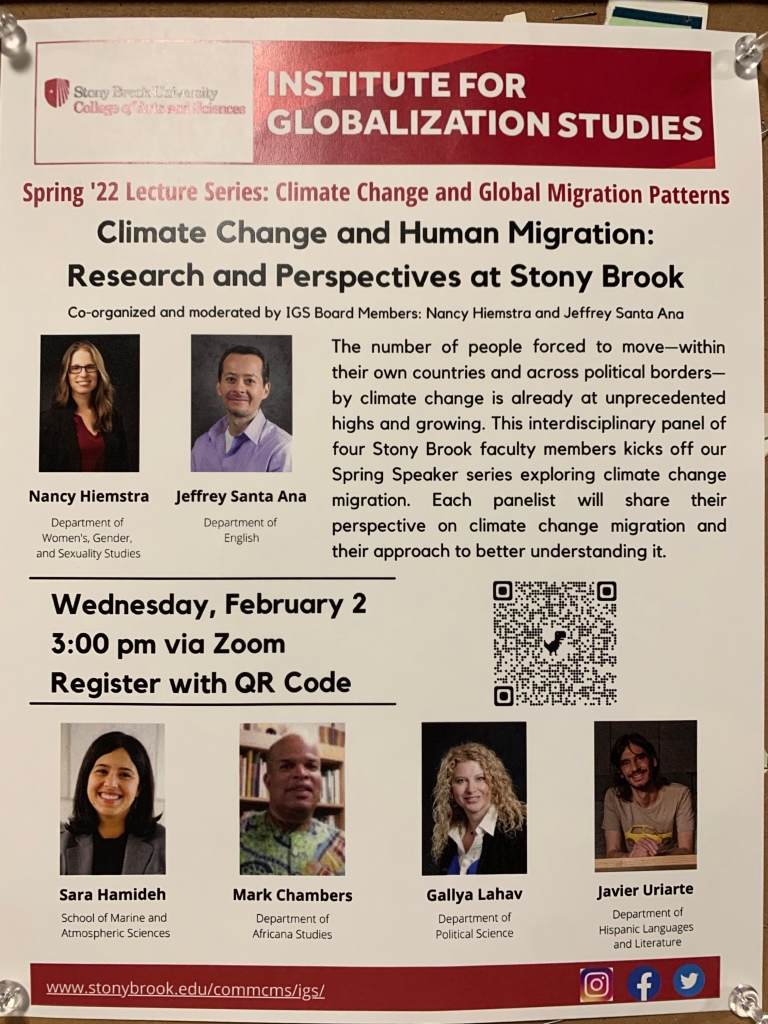
The Institute for Globalization Studies presents Climate Change and Global Migration Patterns featuring our very own Dr. Mark Chambers, Dept. of Africana Studies, also a lecturer in the History Department, and author of a new book.
Vent takes place Wednesday, February 2, 2022 | 3:00 pm
Register for this virtual event here: https://tinyurl.com/hav84nn5
Co-organized and moderated by Nancy Hiemstra, Department of Women’s, Gender and Sexuality Studies, and Jeffrey Santa Ana, Department of English. Featuring our very own Mark Chambers. Part of the Institute’s Climate Change and Human Migration: Research and Perspectives at Stony Brook Spring ’22 Panel Series. See you there!
